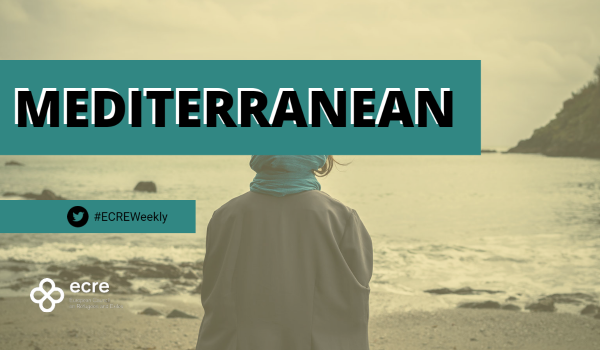- The Albanian parliament has voted to approve a deal for the country to house thousands of asylum seekers for Italy, despite protests from both opposition MPs and human rights groups.
- More than 100 Syrian refugees are stuck in limbo following a spat between Cyprus and Lebanon despite the two countries having a controversial returns agreement.
- Rescue organisations have again blamed the new Italian legislation for thousands of deaths in 2023 as more rescues take place and the death toll rises.
On 22 February, the Albanian Parliament approved the Italy-Albania externalisation agreement to house migrants while their asylum requests are processed. In a post on X, Italy’s prime minister, Giorgia Meloni, acknowledged Albania’s decision, saying, “The Albanian Parliament today ratified the cooperation agreement with Italy against illegal immigration and human trafficking…” This follows a series of approvals in both countries’ courts and parliaments, most recently the Italian Senate. The five-year deal, under which Albania will shelter up to 36,000 migrants a year in detention centres funded by Italy while the latter ‘fast-tracks’ their asylum requests, has been heavily criticised by NGOs including ECRE member organisation the International Rescue Committee. In an opinion piece, it wrote that “The EU’s deals with Turkey and other countries such as Libya and Tunisia provide clear evidence that deterrence measures will not stop people from risking their lives in search of safety and security in Europe”.
A group of 116 Syrian migrants who were rescued off the coast of Cyprus after departing from Lebanon have been caught up in a dispute between the two countries. Upon their arrival in Cyprus, police and national guard vessels escorted them back to Lebanon. Lebanese authorities reportedly refused to accept the group, despite an apparent controversial agreement on returns between Cyprus and Lebanon. The group was eventually escorted back to Cyprus where they are now being housed in a camp. This treatment of the Syrian refugees is perhaps unsurprising since the President of Cyprus, Nikos Christodoulides, said that the European Union would not be serving its interests if it failed to consider designating parts of Syria as safe zones to which refugees and migrants could return. “There are areas in Syria in which we must examine whether they are safe and by extension, enable the return of migrants from those specific areas,” he said. However, according to a report by the United Nations Refugee Agency (UNHCR), Syrian returnees are subjected to “gross human rights violations and abuses.” Meanwhile, 41 organisations, including several ECRE member organisations, have also called on the Cypriot police to ensure that attacks and harassment against the NGO Action for Equality, Support, Antiracism (KISA) are stopped, and to protect the civic space. KISA’s office was bombed on 5 January and the Cypriot authorities have yet to issue an official response.
The situation in the Mediterranean Sea continues to be calamitous for migrants trying to cross into Europe. Various rescue groups that operate in the Mediterranean have called for a change in Italian legislation, which they say is partly to blame for the drowning of more than 3000 people in 2023. They warn that the decree, which requires their boats to return directly to a designated port, often far away, is preventing them from helping people in distress. On 21 February, 121 people were safely disembarked in Bari from the Doctors Without Borders (MSF) rescue ship the Geo Barents. This followed a series of tragic events. On the eve of 21 February, two women died aboard the ship. On 19 February, the Geo Barents rescued 37 people and who had reportedly spent at least four days at sea as they tried to reach Bari and who were suffering from dehydration. On 17 February, the ship rescued 80 migrants but two others were confirmed dead and three were still missing. Aegean Boat Report shared information on X about pushbacks that had been committed by Greek authorities against migrants, including Palestinians fleeing from Gaza. Meanwhile, Tunisia’s coastguard recovered the bodies of nine people who died after their boat sank on 15 February in another disaster. It also managed to rescue 45 people from the boat after it started to fill with water off the coast of Zarzis, near Tunisia’s border with Libya. This tragedy follows Tunisia’s record-high migrant death toll in 2023. Islem Ghaarbi, a migration expert at the Tunisian Forum for Social and Economic Rights, told a press conference that “1,313 people have died or have been reported missing off the Tunisian coast, a figure that has never been reached in Tunisia.”
For further information:
- ECRE, Mediterranean: Ongoing Fatal Journeys Amid Lack of Safe Routes – New Details About Cutro Tragedy Revealed – Italian Prime Minister Hosts Africa-Italy Summit to Expand Partnerships with Third Countries – Italy’s “Detention Deal” Gets Approval from Albanian Constitutional Court, February 2024
- ECRE, Mediterranean: Ongoing Crossings and Rescue Efforts Despite Criminalisation of Rescue Organisations by Italian Authorities – Open Arms Ship Facing 20-Days of Detention While Ocean Viking Returns to Sea – Italian MPs Approve Migration Deal With Albania – Cyprus Praised for “Successful” Migration Strategy Amid Increase in Far-right Violence, January 2024

